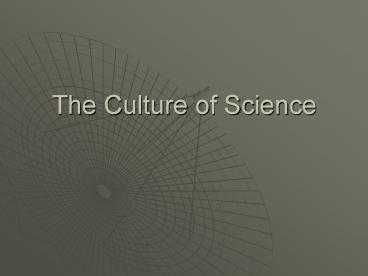The Culture of Science - PowerPoint PPT Presentation
1 / 29
Title:
The Culture of Science
Description:
Experiments, observations, facts. Technology. Scientific terminology. Universal measures ... them is no more likely to fit the enterprise that produced them tan ... – PowerPoint PPT presentation
Number of Views:305
Avg rating:3.0/5.0
Title: The Culture of Science
1
The Culture of Science
2
(No Transcript)
3
(No Transcript)
4
(No Transcript)
5
(No Transcript)
6
Scientific ideas
- Space, time, matter
- Atoms
- Homogeneous universe
- Laws of nature
- Experiments, observations, facts
- Technology
7
Scientific terminology
- Universal measures
- Mathematical language or the imitation of
mathematical language - Vocabulary ( stem cells, spaceships, cell-phones,
nanoparticles, electrons)
8
Scientific Ideology
- Constructing a heroic past
- Progress
- Heroes
9
(No Transcript)
10
(No Transcript)
11
(No Transcript)
12
Scientists as heroes of the modern world
- 19th century
- Continuous progress
- The Pantheon of Scientists
- B.J. T. Dobbs, Newton as a Final Cause or the
First Mover - Positivist images of science
13
Positivist image of science
- Science consists of theories
- Theories are tested and confirmed by experiments
- Each new accepted theory is better than the
previous one because it is closer to the truth - Scientific progress development- by-
accumulation (Kuhn)
14
- History, if viewed as a repository for more than
anecdote or chronology, could produce a decisive
transformation in the image of science by which
we are now possessed. That image has previously
been drawn, even by scientists themselves, mainly
from the study of finished scientific
achievements as these are recorded in the
classics, and more recently, in the
textbooksInevitably, however, the aim of such
book is persuasive and pedagogic a concept of
science drawn from them is no more likely to fit
the enterprise that produced them tan an image of
a national culture drawn from a tourist brochure
or a language text. This essay attempts to show
that we have been misled by them in fundamental
ways. (Kuhn, 1962)
15
History of Science
- Continuitist a successive string of theories
and world pictures, better in some respect than
their predecessors - Revolutionary- radical discontinuities
16
Discontinuities?
17
(No Transcript)
18
(No Transcript)
19
(No Transcript)
20
(No Transcript)
21
(No Transcript)
22
Our universe?
23
Scientific ideologies
24
1. The Scientific positivism
- Science consists of theories (laws, observations,
experiments, explanations, descriptions) - Theories are tested and confirmed by experiments
- Each new accepted theory is better than the
previous one because it is closer to the truth
(or more explanatory) - Scientific progress development-by accumulation
25
Poppers view of science
- Science is a corpus of theories
- Each theory is tested against experiments
- The purpose of experiments is to infirm a theory
- No theory is ever confirmed by experiment. Each
theory is only a tentative description of the
reality - Each theory it will eventually fail and be
replaced with a better one - Better closer to the truth
26
2. The historicism
- Science does not uniformly progress through
scientific method - Science - a historical development
- Scientific theories develop inside paradigms
(higher rank theoretical models) - Normal science, science in crisis, revolution
- Incommensurability of paradigms
27
- Thomas Kuhn, The Structure of Scientific
Revolutions, 1962 - Alexandre Koyre, From the Closed World to the
Infinite Universe, The Astronomical Revolution
etc. - Gerald Holton, Thematic Origins of Scientific
Thought - A.C. Crombie, Styles of thinking
28
3. The science as a cultural construct
- science will be presumed to be a human cultural
institution whose interactions with other
cultural institutions are subject to all of the
kinds of questions that might be asked of any
other What interests does it legitimately
serve? and What interests does it legitimately
threaten? From this point of view it becomes
possible both to ask why some group of individual
within a particular historical context should
selectively accept elements of the scientific
tradition and to understand that other groups or
persons might have legitimate and rational
grounds for rejecting them. (Olson,1990, p.5)
29
- Shaffer, Shapin, Leviathan and the Air Pump, CUP,
1986 - Shapin, The Scientific Revolution, 1996
- The Edinburgh School































